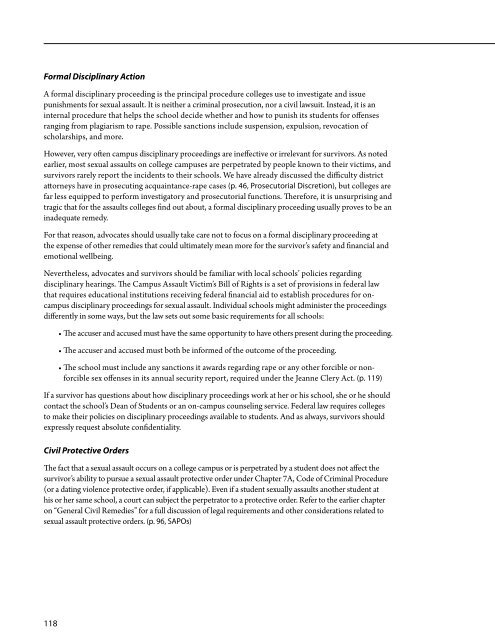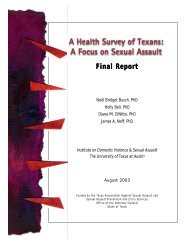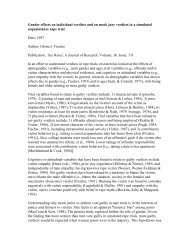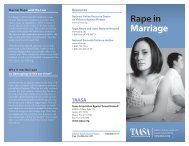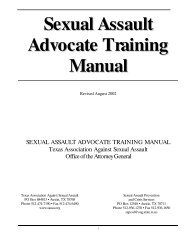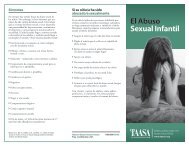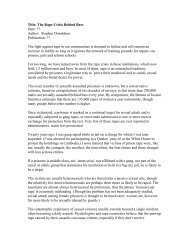Sexual aSSault LEGAL ADVOCACY MANUAL - Texas Association ...
Sexual aSSault LEGAL ADVOCACY MANUAL - Texas Association ...
Sexual aSSault LEGAL ADVOCACY MANUAL - Texas Association ...
You also want an ePaper? Increase the reach of your titles
YUMPU automatically turns print PDFs into web optimized ePapers that Google loves.
Formal Disciplinary Action<br />
A formal disciplinary proceeding is the principal procedure colleges use to investigate and issue<br />
punishments for sexual assault. It is neither a criminal prosecution, nor a civil lawsuit. Instead, it is an<br />
internal procedure that helps the school decide whether and how to punish its students for offenses<br />
ranging from plagiarism to rape. Possible sanctions include suspension, expulsion, revocation of<br />
scholarships, and more.<br />
However, very often campus disciplinary proceedings are ineffective or irrelevant for survivors. As noted<br />
earlier, most sexual assaults on college campuses are perpetrated by people known to their victims, and<br />
survivors rarely report the incidents to their schools. We have already discussed the difficulty district<br />
attorneys have in prosecuting acquaintance-rape cases (p. 46, Prosecutorial Discretion), but colleges are<br />
far less equipped to perform investigatory and prosecutorial functions. Therefore, it is unsurprising and<br />
tragic that for the assaults colleges find out about, a formal disciplinary proceeding usually proves to be an<br />
inadequate remedy.<br />
For that reason, advocates should usually take care not to focus on a formal disciplinary proceeding at<br />
the expense of other remedies that could ultimately mean more for the survivor’s safety and financial and<br />
emotional wellbeing.<br />
Nevertheless, advocates and survivors should be familiar with local schools’ policies regarding<br />
disciplinary hearings. The Campus Assault Victim’s Bill of Rights is a set of provisions in federal law<br />
that requires educational institutions receiving federal financial aid to establish procedures for oncampus<br />
disciplinary proceedings for sexual assault. Individual schools might administer the proceedings<br />
differently in some ways, but the law sets out some basic requirements for all schools:<br />
• The accuser and accused must have the same opportunity to have others present during the proceeding.<br />
• The accuser and accused must both be informed of the outcome of the proceeding.<br />
• The school must include any sanctions it awards regarding rape or any other forcible or nonforcible<br />
sex offenses in its annual security report, required under the Jeanne Clery Act. (p. 119)<br />
If a survivor has questions about how disciplinary proceedings work at her or his school, she or he should<br />
contact the school’s Dean of Students or an on-campus counseling service. Federal law requires colleges<br />
to make their policies on disciplinary proceedings available to students. And as always, survivors should<br />
expressly request absolute confidentiality.<br />
Civil Protective Orders<br />
The fact that a sexual assault occurs on a college campus or is perpetrated by a student does not affect the<br />
survivor’s ability to pursue a sexual assault protective order under Chapter 7A, Code of Criminal Procedure<br />
(or a dating violence protective order, if applicable). Even if a student sexually assaults another student at<br />
his or her same school, a court can subject the perpetrator to a protective order. Refer to the earlier chapter<br />
on “General Civil Remedies” for a full discussion of legal requirements and other considerations related to<br />
sexual assault protective orders. (p. 96, SAPOs)<br />
118


